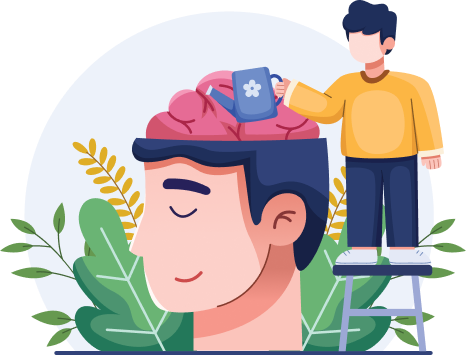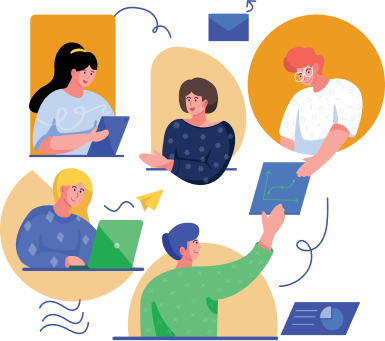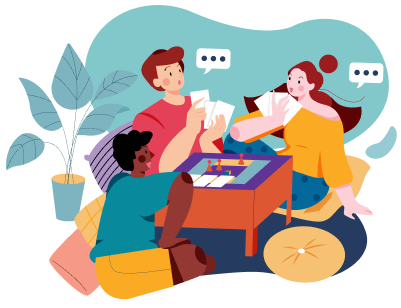Frequently Asked Questions
Teen Participation
What can we do to ensure teen participation throughout?
Keeping teens engaged starts with making them feel heard, respected, and involved from the beginning. Use co-design strategies to build with teens, not just for them. Offer a brave space for sharing so that teens feel safe to join the conversation. Keep the sessions interactive and varied, incorporating creative challenges, personal reflection, and peer collaboration. End your sessions with a moment for reflection. Make them feel heard by directly incorporating their ideas and feedback into subsequent sessions.
Skills Needed
Does the library staff facilitating the NM program need to be experts in co-design?
Working with teens rather than leading them is key. It allows them to open up and feel a sense of agency. Prior to launching a Nourishing Minds program, library staff will need to understand the ideas inherent in co-design activities. Co-design facilitation requires flexibility in facilitation along with the ability to empower co-designers (in this instance teens) to have a real voice in the co-design process. Library staff starting out in co-design may want to work with a co-facilitator and discuss with others the co-design process and what makes it different from more traditional facilitation techniques. Go to the Guiding Philosophies page to learn the highlights of co-design, and then see the cookbook section entitled “Co-Designing with Teens” in the cookbook.
What teen-related skills do we need to facilitate this program?
You don’t need to be a mental health expert to run Nourishing Minds. What matters most is your ability to build trust and create a welcoming space where teens feel seen and heard. Helpful skills include active listening, flexibility, co-facilitation, cultural awareness, and comfort with creativity.
If you’re willing to learn alongside your teens and hold space for honest conversation, you’re already well on your way.
Do we need to have a mental health expert on our NM team?
The Nourishing Minds program is designed for library staff who care about teen well-being and want to create a safe, supportive space. While it’s helpful to know how to refer teens to professional support if needed, the tools and resources in the program are made to guide non-experts every step of the way.
Planning and Facilitating Sessions
How much time is needed to plan for each session?
One to two hours on average are required to plan each Nourishing Minds session. This planning includes designing a co-design session agenda and developing resources, such as Miro Boards (if connecting online), to use during the session.
How much time is needed to debrief after each session?
The co-facilitators and participating project team should schedule approximately 15 minutes following each co-design session to reflect on how the session went, changes they would make in the future, and next steps.
Should I be ready to change a session plan if things are not going as expected?
Yes, a co-design experience should be founded on flexibility. If you realize that the process isn’t going as planned, use that as a learning opportunity and a chance to talk with the co-designers about making changes in order to move forward more successfully.
Do we need to have community partnerships in place?
It is important to have partnerships in place prior to the launch of the program. These partnerships are especially important if your library has historically struggled with recruitment of youth for programs. If the partnerships are not in place, library staff will want to add time to their planning process to build those relationships.
Scheduling
What is the typical duration for a program like Nourishing Minds?
We recommend a Nourishing Program to take between 6-8 weeks. This timeline allows for relationship building and deeper connection between library staff and youth participants.
What do I need to think about as I schedule a Nourishing Minds program?
As you begin to plan and schedule a Nourishing Minds program you will want to consider all of the people involved including library staff, community partners, and teens. Consider teen schedules and when a recurring program might best fit with their schedules.
How frequently should sessions be scheduled?
We suggest hosting sessions once a week or every other week in order to keep momentum while allowing for project team planning time between sessions.
How long should each session last?
We suggest 90-minutes for each session, this will help to create sessions that don't feel rushed.
Can I add more sessions than outlined in the materials presented on the site?
Absolutely. The goal of Nourishing Minds is to serve as a guide from which libraries are inspired to customize and extend, meeting the needs of the teens in their local communities and neighborhoods. We established a framework which your library can replicate with content relevant to your teen population.
Can we offer Nourishing Minds more than once?
Yes! Our mission is to support teen mental health by fostering BRAVE SPACES where young people can explore, share, and address their mental health needs. Through the integration of CO-DESIGN practices and ACT (Acceptance and Commitment Therapy) principles,we aim to empower people with a comprehensive framework and practical tools to create meaningful, supportive environments for teens. Offering Nourishing Minds repeatedly, and in more places, is what will help us accomplish this mission.
Costs
What costs should my library plan for?
Libraries need to consider human resources - staff time for learning and understanding the Nourishing Minds framework and the time commitment involved in implementing the program. It is also possible that library staff may want to have funds available to pay teens a stipend for their participation. Snacks are also highly encouraged at every session.
Will costs remain the same each time we repeat the program?
As your library continues to offer multiple rounds of the program, costs are likely to decrease as more experienced staff can help onboard new staff for best practices in implementing the Nourishing Minds framework.
Miscellaneous
How do I get buy-in from library management?
As you begin to think about and plan for a Nourishing Minds program, you will want to start talking with colleagues and library leadership about the positive impact of the program. Tie impact related to mental health, digital literacy, and 21st century workforce development skills to the library’s mission, values, vision, and strategic plan. The Resources section of this site links to materials that will prove useful as you plan your conversations with colleagues and administrators.
What technology do I need?
If you’re hosting the program in person, you can run the program without any technology! Although at times, a computer and projector could help show examples of previous co-design activities like ‘wild eights’ or ‘personas’ to a large group.
Does the library staff facilitating the Nourishing Minds program need to have expertise in co-design?
Working with teens rather than leading them is key. It allows them to open up and feel a sense of agency. Prior to launching a Nourishing Minds program, library staff will need to understand the ideas inherent in co-design activities. Co-design facilitation requires flexibility in facilitation along with the ability to empower co-designers (in this instance teens) to have a real voice in the co-design process. Library staff starting out in co-design may want to work with a co-facilitator and discuss with others the co-design process and what makes it different from more traditional facilitation techniques. Go to the Guiding Philosophies page to learn the highlights of co-design, and then see the cookbook section entitled “Co-Designing with Teens” in the cookbook.
Do we need to have a mental health expert on our Nourishing Minds team?
A mental health expert is not required. However, library staff must be comfortable talking about various aspects of mental health and understand that library mental health services include giving teens the chance to de-stress and talk with each other about how they are feeling. For more information, review the ACT Principles section of the Nourishing Minds Cookbook.



